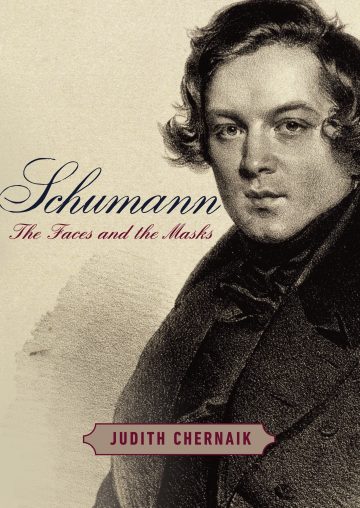Picture a man swooning and raging with all the passions of youth. Every problem is a crisis, each feeling an ocean. His commitment to political and artistic freedom yields only to the irrepressible truths of love and beauty. Put that exhausting spirit to music and you have the tragic Romantic composer Robert Schumann. His diaries repeatedly refer to the worst day or night or week of his life. He spent his free time wandering the countryside and yearning. In the first of several autobiographies, he wrote: “Already in my eighth year—if one can believe it—I learned to know the art of love.” The superintendent’s daughter Emilie was his paramour.
Today’s reader might confront such a person and ask him to calm down. Yet Schumann (1810-56) not only embodied the spirit of his age, he converted his existential anguish and romantic ardor to music. He composed some of his best work while longing for his future wife, Clara Wieck, whose father forbade their union. Likewise, Schumann wrote his finest songs in the Lieder tradition by quitting his desk and taking to the hills. As Judith Chernaik relates in “Schumann: The Faces and the Masks,” he stopped composing at the piano and began crafting songs “while taking walks in which the poems assumed melodic shape.” The accompaniments came later, upon returning home.
Ms. Chernaik, an American who has lived and taught in London for more than 30 years, is well-positioned to undertake a biography of Schumann, even though the path is well-trod. (Several other biographies in English as well as the composer’s collected letters have appeared in the past decade.) A novelist and academic specialist on the poetry of Shelley, she is an enthusiastic student of Schumann’s music and a fine chronicler of his turbulent life. “The Faces and the Masks” is a well-proportioned, highly readable biography for general readers that establishes Schumann as a man thoroughly of his time.
The book’s greatest contribution is to situate Schumann in a remarkable fraternity of 19th-century composers. He knew and admired contemporaries from Chopin to Liszt, but his most important colleague was Felix Mendelssohn, who earned fame before his younger friend and did all he could to promote Schumann’s works. They were “two sensitive, prickly composers of genius,” Ms. Chernaik writes. “Schumann admired Mendelssohn above all other musicians, but there were recurrent tensions,” including “an insidious mixture of envy and resentment.” Mendelssohn served as godfather to one of Schumann’s children and was namesake to another. The two composers fell out for ambiguous reasons that may have had to do with anti-Semitism. Yet Schumann was devastated by Mendelssohn’s death and served as a pallbearer to the man he called “a true God.”
Still, no relationship in Schumann’s life can compare with the remarkable partnership he shared with his wife, Clara, a composer and virtuoso concert pianist. The two were childhood playmates; Schumann took piano lessons from Clara’s father, Friedrich Wieck. Schumann’s own performing career was cut short when he injured three of his fingers with a contraption meant to strengthen the hand. Yet, unlike Clara, he lacked natural brilliance at the piano and so decided to devote himself to composition. Wieck steadfastly opposed the courtship, which took place before Schumann had earned a name for himself. The obstacles Wieck placed in the way of the two lovers can make him seem almost a cartoon villain. Schumann even successfully sued him for defamation, landing his future father-in-law a short prison sentence.
Ms. Chernaik casts new light on Wieck’s motivations. She quotes from a previously unpublished letter confirming the reason for the paterfamilias’s divorce from Clara’s mother, Mariane. The cause was infidelity. The letter to Wieck from Mariane’s father reads: “Never would I have believed that Mariane could sink so low . . . and I cannot understand even now how she can have become what she now is. My God! Must I and my dear wife in our old age live through such disgrace from a child whom I raised with so much care?”
Ms. Chernaik writes that this betrayal may have motivated Wieck’s implacable hostility to a match between Clara and Schumann. “Was it possible that Clara, his darling, his creature, had inherited her mother’s low character? He could not bear the thought that having lost her mother, he would now lose his daughter.” Some will write this off as speculation or armchair psychology—but it is certainly plausible. In any event, the letter is a remarkable discovery.
Once the couple had united, Clara served as breadwinner by concertizing across Europe, leaving her beloved husband the freedom to compose. She was his greatest champion, and the two artists’ devotion to each other is extraordinary. Their arrangement left Clara less time for her own composing, but Ms. Chernaik insists that her choices were hers alone: “Although it has been fashionable to consider her a victim of contemporary attitudes toward women composers, it was her own decision to put Schumann’s needs as both a man and an artist ahead of her own. She was always the stronger of the two, and her fame as the greatest woman pianist in Europe far outshone Schumann’s uncertain reputation.”
Schumann worked with all the fury of a Romantic: quickly, in passionate, frenetic bursts. Many of his works have entered the standard concert repertoire, including the song cycle “Dichterliebe” (“A Poet’s Love”), the exquisite piano trios, the four symphonies (especially the “Rhenish”), and the concertos for cello and piano. Yet in later years, as mental illness began to appear, his compositions became uneven. And throughout his composing life, he could seem overwhelmed by admiration for his forebears. He labored in the shadow of Schubert’s songs, Beethoven’s symphonies, and Bach’s and Chopin’s works for keyboard. Ms. Chernaik is an ardent admirer of Schumann’s music and asserts that each of his compositions bears his own stamp. It is possible for that to be true and also to say that Schumann’s corpus lacks the shine of utter originality that characterizes the very greatest musical artists.
Yet no one can disagree that his voice was silenced prematurely. In 1854 a syphilitic infection from 25 years earlier led to a mental breakdown, attempted suicide and eventual commitment in an asylum, where Schumann slowly succumbed to general paralysis. He died in agony two years later, at age 46. And yet in his final months, the two great themes of his life brought comfort: Clara’s undying love and affection, and the fellowship of other musicians, in this case, the young Johannes Brahms. (Brahms visited the ailing composer and comforted Clara, even falling in love with her, and later the two edited and presented Schumann’s complete works.) Still, it was a terrible end to Schumann’s story—and also terribly Romantic.







